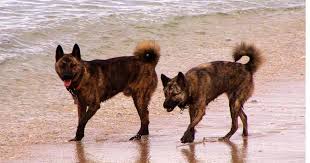
Ryukyu
Conditions of detention
Ryukyu dogs adapt well to various living conditions but thrive in homes with access to outdoor spaces where they can exercise. They are not ideal for apartment living unless they receive ample outdoor activities.
Useful Fact: They enjoy having a secure yard to explore, which helps satisfy their natural curiosity and hunting instincts.
Nutrition and diet
A balanced diet rich in protein is essential to support their active lifestyle and maintain their muscular build. High-quality commercial dog food or a well-planned homemade diet is recommended.
Useful Fact: Including fish or seafood in their diet can be beneficial, as it reflects their traditional coastal environment and provides essential nutrients.
Health
Ryukyu dogs are generally healthy but can be prone to certain genetic conditions, such as hip dysplasia and skin allergies.
Useful Fact: Regular veterinary check-ups and maintaining good hygiene can help prevent common health issues.
Grooming and care
Their short to medium-length coat requires regular grooming to remove loose hair and keep the coat healthy. Brushing once a week and bathing as needed are recommended.
Useful Fact: Regular grooming sessions also provide an opportunity to check for ticks and other parasites, especially if they spend a lot of time outdoors.
Education and training
Ryukyu dogs are intelligent and eager to please, making them highly trainable. Early socialization and obedience training are crucial.
Useful Fact: Positive reinforcement techniques work best, as Ryukyu dogs respond well to rewards and gentle guidance.
Toys and entertainment
Interactive toys, puzzle games, and activities that engage their hunting instincts, such as fetch and tracking games, are ideal. Regular mental stimulation is important.
Useful Fact: Providing a variety of toys can help keep them entertained and prevent boredom-related behaviors.
Safety
Given their strong prey drive and curiosity, Ryukyu dogs should be supervised around small animals. Secure fencing is necessary to keep them safe and contained.
Useful Fact: Leash training is crucial for their safety during walks, as they may be inclined to chase wildlife.
Accessories
Sturdy collars, leashes, and comfortable bedding are necessary. Given their activity level, durable accessories are recommended.
Useful Fact: A harness can provide better control during walks and help manage their pulling tendency when excited.
Socialization
Early and consistent socialization with other dogs, animals, and people is important to ensure they grow into well-rounded adults.
Useful Fact: Regular playdates and exposure to different environments can enhance their social skills and reduce anxiety.
Travel and Transportation
Traveling with a Ryukyu dog requires planning due to their size and energy levels. They need secure arrangements and ample breaks during long trips to stay comfortable.
Useful Fact: Training them to be comfortable in a car from a young age can make travel easier and less stressful.
Behavior and psychology
Ryukyu dogs are known for their intelligence, loyalty, and strong hunting instincts. They are affectionate with their families but can be wary of strangers.
Useful Fact: Understanding their need for mental and physical activity can help in managing their behavior and ensuring a happy, well-adjusted pet.
Legal aspects
Owning a Ryukyu dog may be subject to specific regulations, especially in areas with breed-specific legislation.
Useful Fact: Checking local regulations regarding pet ownership can help ensure compliance and prevent legal issues.


